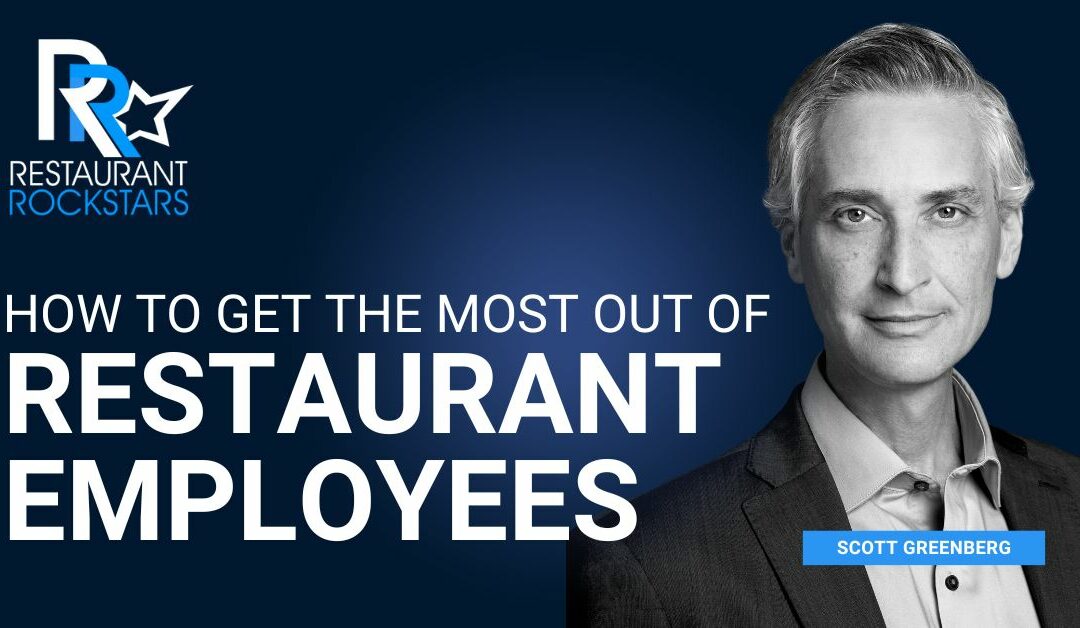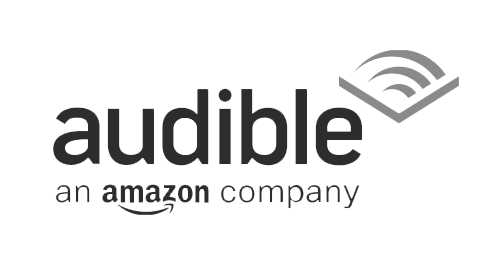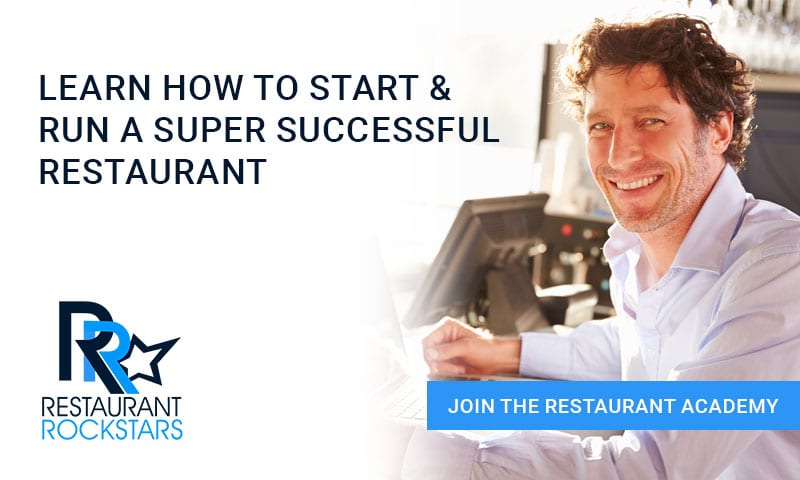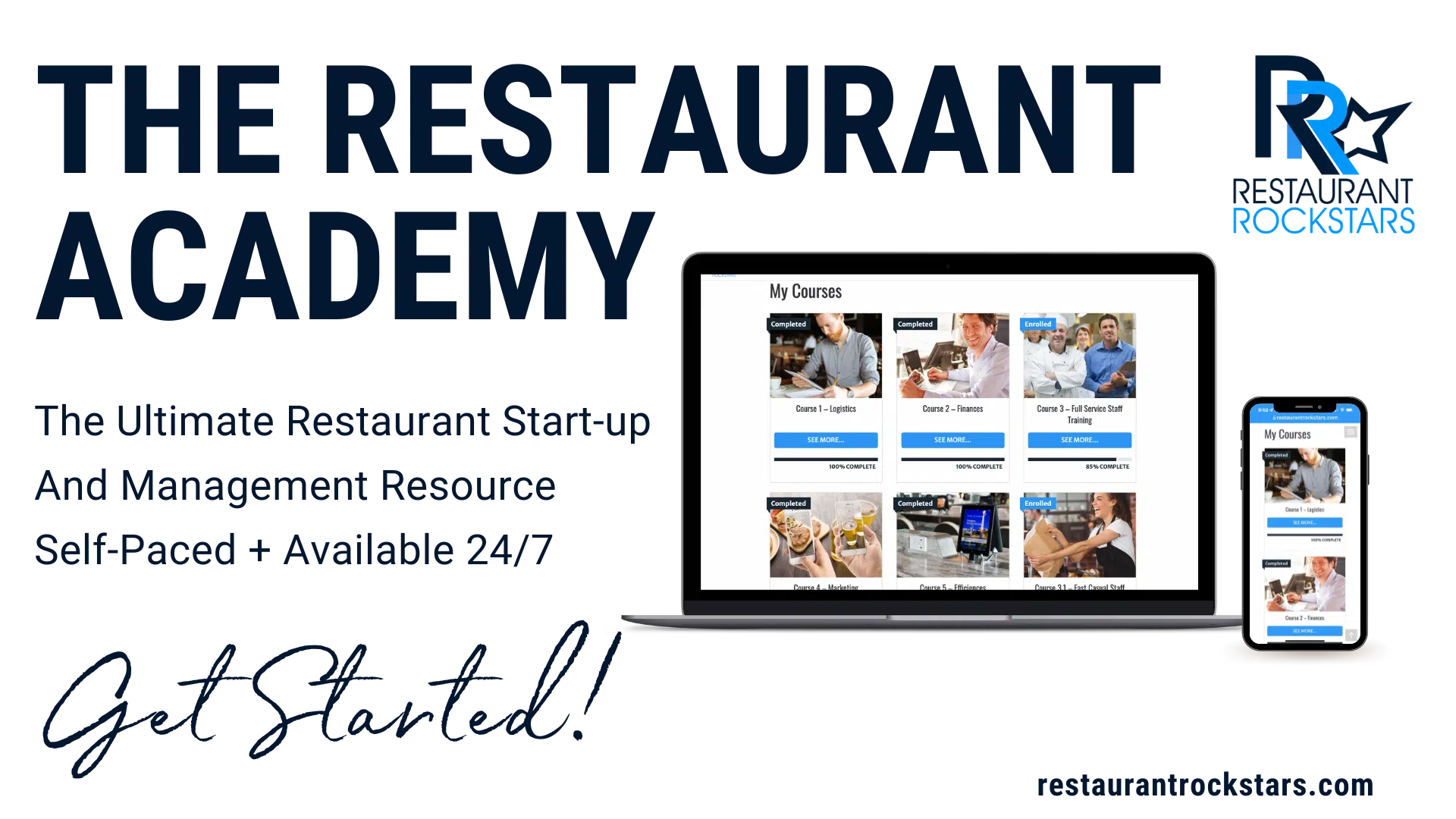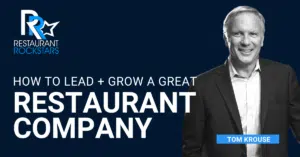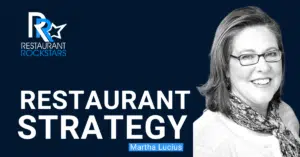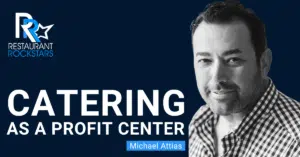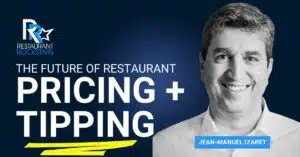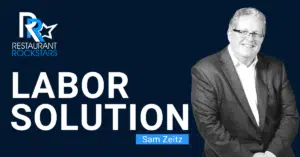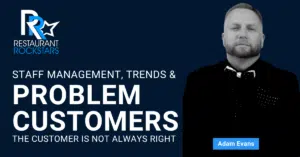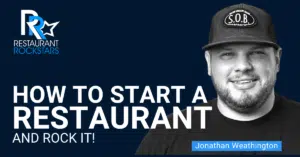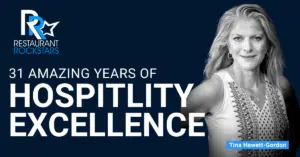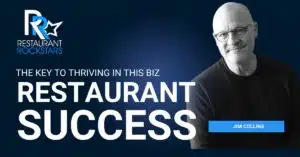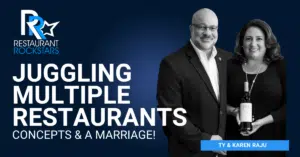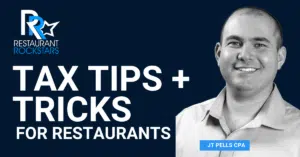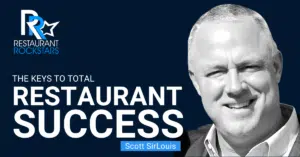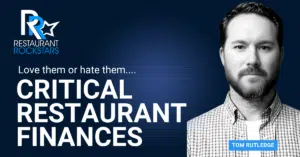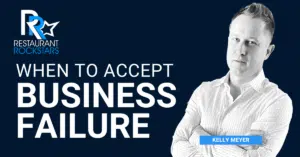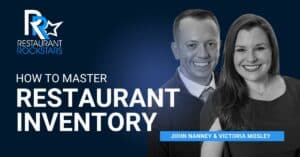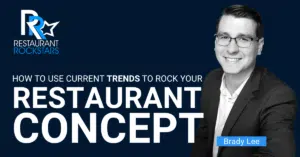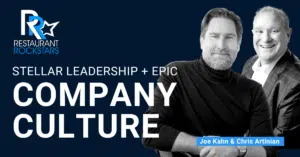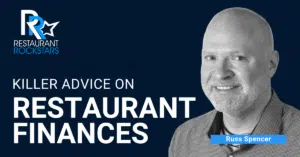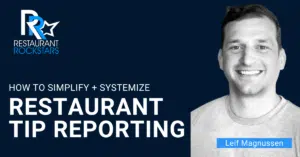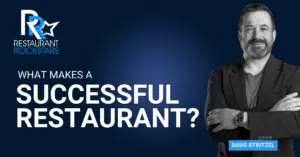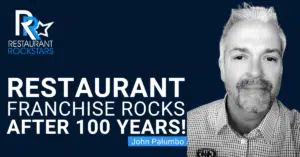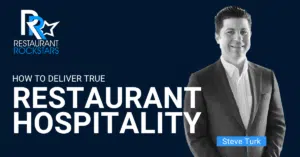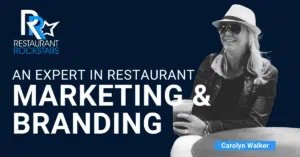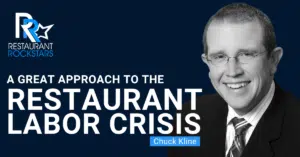Restaurant Rockstars Episode 376
Awesome Restaurant Employees: What they REALLY Want
LISTEN HERE OR ON YOUR FAVORITE PODCAST PLAYER
I hear it time and time again.
“My restaurant employees don’t do what I expect… they call out on shifts, or they don’t show up at all”!
Since the pandemic; finding, keeping, and motivating restaurant employees has just gotten harder. They seem to have a different mindset… their work ethic doesn’t meet expectations… What to do?
In this episode of the Restaurant Rockstars Podcast, I’m speaking with Scott Greenberg, a leadership and performance expert about what restaurant employee really want.
On top of being a leading franchisee himself, Scott is an author and internationally acclaimed speaker for TEDx and leading top organizations in many industries.
Listen as Scott advises how to manage your restaurant employees with excellence, including:
- The difference between true leadership and being a manager
- How a restaurant can create a strong company culture
- Understanding the values of younger workers and the four personality types of hourly restaurant employees
- Effective ways to motivate today’s hourly restaurant employees
- The difference between a “results oriented vs. “people oriented” approach
- What is a “Peak Performance Mindset”
- How to turn a “paycheck collector” into an A-Player
And of course what you can learn and apply from Scott’s new book: Stop the Shift Show: Turn Your Struggling Hourly Workers Into a Top-Performing Team.
Don’t miss this episode, get my FREE “Top 3 Ways You’re Killing Your Restaurant Profits and a bonus at www.restaurantrockstars.com/profits then go out there and Rock YOUR Restaurant!
Roger
Connect with our guest:
Website | Book | Twitter | LinkedIn | Facebook | YouTube | Instagram | TEDx
Welcome back to the podcast. I’m a huge believer in changing the restaurant mindset from Management to true leadership. Now, I believe that just because somebody is promoted to be a manager or holds that title does not necessarily mean that they are competent to lead, that they’re experienced, or that they inspire and motivate others.
So this week’s guest, Mr. Scott Greenberg, A leadership and an hourly employee expert. We’re going to talk all about what motivates people when , so many of us, , are having challenges with hourly people and their mindsets and getting into their heads and why do they do the things they do and Why do they not show up sometimes or call in?
It’s like, how do we motivate? How do we reach these people and really get the most out of their performance? So you’re not going to want to miss this episode. So thanks for being with us. Thank you also to the sponsors this week. And if you haven’t already, please head on over to restaurantrockstars.com/profits.
I’m giving away three ways you’re killing your restaurant profits, plus a unique. Bonus, a complete restaurant assessment, whether you’ve got a full serve restaurant or a quick serve fast casual operation, it is a series of thought provoking questions all about your operation and what you might be missing to literally increase your profitability and have yourself a more profitable and successful business, so check that out.
, on with the episode.
You’re tuned in to the Restaurant Rockstars Podcast. Powerful ideas to rock your restaurant. Here’s your host, Roger Beaudoin.
This year, give your team the gift of PopMenu AI Answering, a simple solution for phones ringing off the hook. AI Answering handles calls 24/7, 365 days a year, so your staff can focus on in person guests.
Customize your greetings and responses. Answer common questions. promote specials and events, and send follow up links to ordering and reservations. AI answering handles it all, while escalating more complex conversations back to your team. Now, never miss another tasty revenue opportunity. PopMenu is the marketing technology platform designed to make growing your restaurant easy.
Discover more A. I. restaurant tools that turn your to do list into an already done list. Request a demo today and my listeners for a limited time will get $100 off their first month, plus lock in one unchanging monthly rate. Go now to popmenu.com/rockstars again, get $100 off your first month at popmenu.com/rockstars
running a restaurant is a marathon of management. You’re constantly managing customers, employees, vendors, menus, marketing, and the list goes on. But don’t forget the essential element, managing inventory, a crucial factor that can make or break your success. Listen, Sculpture Hospitality is the secret ingredient you’ve been missing.
They don’t just manage your food and beverage inventory, they blend expertise with technology. They take your inventory, sales, purchases, everything, and transform it into a roadmap for your restaurant’s success, painting a vivid picture of your profitability. Their range of service options will meet your needs and your budget.
Are you looking for a hands on, full service solution using one of their inventory experts? Or do you prefer sharing inventory responsibilities? Or even a self service option? Sculpture Hospitality Services are like a customized menu. Take charge of your bar or restaurant inventory today. Get a free, no obligation, inventory consultation from Sculpture Hospitality.
Visit SculptureHospitality.com/rockstar and discover their inventory solution that matches your needs, your budget, and your success.
Scott, so excited to have you here. Welcome to the
show today. Thank you. I’m glad to finally be on.
Man, you’re a super dynamic guy and you’re full of energy here. And this topic today is really near and dear to my heart. It’s really all about leadership and hospitality and really getting the most out of your people.
So I’m excited to talk to you, but let’s begin by talking about your backstory.
Ferris, so I am the son of a serial entrepreneur. Which is a formal way of saying my dad couldn’t keep a job. So he had lots of businesses growing up and probably 75 percent of his businesses were restaurants. Some he started on his own.
Some were franchises. It ranged from a donut shop to a sandwich shop, to Southern food, to Italian food. My first job was working in a store he had in San Diego’s Seaport Village. He had no idea the store was going to be, Seaport Village was going to be such a huge location. It was an ice cream store that also made sandwiches.
So I think it was eight or nine years old when I started working as a busser. I would punch in, they’d hide my time card in case someone from the labor department came in pay me, I don’t know, a dollar or something an hour, and it was great. I got to be part of the family business and I was exposed to everything restaurants at a very early age.
The good, the bad, and the ugly.
That’s fantastic. So were you passionate about the business at a young age? Did you dive in and say, I really enjoy this or did it just come to you later in life?
I’d say it came to me later. Back then it was just cool to be like in the business and to feel useful.
And the idea of making money was cool, but when you’re eight years old, money doesn’t mean a whole lot other than it’s a symbol of, wow, you’re a useful person who gets to help out. Now there’s one day. When I was, I don’t know, maybe 12 years old and I was on a break and there was a video arcade, which was a thing at the time.
And I was like just having this awesome game in a pinball machine. And my dad came in and said, it’s lunch rush. You got to get back to the store. That was the first time I felt what work is actually like. Because that’s not where I wanted to be, but I went back and it was, we were just slammed. But over time, I, my mentality around it changed.
I was more like my father where I wanted to, work for myself and I certainly liked all things food and hospitality. So my head was always aligned with my father in that way. So
you were never in line to take over those family businesses, or was that a hope at some point, and then you just said, Hey, this isn’t for me, I’m gonna go explore my, who I am and find out something else, and then maybe I’ll come back to this later, like, how
did that happen?
No I was never, it was never offered, it was never encouraged, I never thought about it, it wasn’t like my dad loved it, he liked putting a deal together, building the restaurants, but he always hated running them. And I saw that. So nothing about that was appealing. I like the idea of maybe working for myself, but when I was in high school and early in college, I was thinking, law school or politics or something like that.
I never thought I would end up doing what I do now. Life just happened to me. You make plans for life, but life has plans for you. And usually life wins that, that arm wrestle tournament. I can
certainly collaborate on that idea. That’s definitely been the trajectory of my career.
Life is what happens when, you’re making other plans and you end up in places you don’t necessarily expect to be. I never thought I’d be in the restaurant business. I saw the opportunity, jumped into it. It happened. It was a great run for me, but God, if you took me back 40 years ago, I’d never say, I’d never be in that business, even though my very first job was a dishwasher at a private country club.
And that was my indoctrination into hospitality. So let’s talk about what happened after, when you, as you got older in your career what types of things
did you do? Okay, so I was a graduate film student at New York University, thinking at the time that I wanted to tell stories for a living.
I was only there for a semester before I was diagnosed with cancer, so I had to drop out of film school. Wow, yeah. Spent about a year battling that, and then rather than going back to film school, I started working in the entertainment industry. But I got an invitation to give a motivational speech at a conference, talk about my experience and how it applied to cancer.
And that one speech led to what would be a 30 plus year career. Doing keynote speaking workshops, it started off about overcoming adversity, then it became about peak performance, and then eventually leadership. And that business was really growing and getting bigger, but it always bothered me that here I am talking to other leaders about leadership when I hadn’t ever really experienced it other than when I was in student government when I was in high school.
And that always bothered me. And my wife and I were starting a family and all the traveling from speaking was getting to me. And I thought, I’d like another stream of income so I could travel a little bit less and get some more real world experience. And that’s when I saw an airline magazine ad for a franchise called Edible Arrangements, which is now a household name at the time it wasn’t, but it’s a floral arrangements made out of fresh fruit.
So not A typical restaurant, but certainly it was the food industry. I had to have a, that sign with the hopefully an A hanging on the wall and have the inspections and all that. So I didn’t give up the professional speaking, but I also ran these businesses. I started off with one store. We built it up into the top location, LA or in California at about 110 stores.
And then several years into it, a neighboring store that was ranked 109th. Out a hundred 10th came up for sale. It’d be a more dramatic story if it was actually a hundred 10th, but I’ll give the guy some credit. It was a hundred ninth, so we bought it and we turned it around and made that profitable.
So I started getting invitations to speak to other franchises, a huge percentage of them restaurants, to talk about what those franchise owners could do to take their restaurants, to take their businesses. And make them successful. So then based on that, I wrote my first book, which is called The Wealthy Franchisee, what these people do that really makes them excellent.
And so I did that for a number of the years where I’m still speaking. And after about 10 and a half years businesses are doing great, decided to sell them. So now I’m back to helping other business leaders, especially restaurateurs run the absolute best businesses possible by focusing on what it is that they bring to the operation specifically the way they think.
The way they lead and the way they serve. So a typical day at work for me is showing up at a conference. Probably 70 percent of the time, it’s a franchise of those, the majority are restaurants. So I show up and I do a keynote and do breakout sessions and moderate panels with all these business owners, helping them make sure that they are an asset to their own business.
That’s a fascinating story. Let’s go back to Edible Arrangements for a moment because I know it’s, it’s a name brand franchise and lots of people have heard of it, of course, but what’s particularly interesting is you were a top franchisee for that brand, but then what really intrigues is that turnaround situation.
Can we dive into that a little bit and tell me about maybe some of the things that you put in place and what the framework was for that turnaround and how you did turn it around? Systems, efficiencies. team salesmanship. It’s what are the key elements? I’m sure there are a lot of details in doing that, but if you could summarize how you turned it around, it’d be really great to our audience to hear.
Sure. Although Roger, you just stole my thunder because you basically listed all the things that we did. But I’ll get a little bit more specific. Yeah, I think that the real test of someone’s business acumen isn’t can they open up one business and have it be successful? Maybe just got some awesome location where the people are just there and the customer service doesn’t matter.
People are just, maybe they’re tourists and it’s a one time transaction. And it’s easy to convince yourself you’re a good business person. For me, part of the challenge was not only can I do it, but can I do it again? Can I take one that’s struggling and turn it around? And and remember, I, I had no point did I give up the professional speaking.
So for me, having these businesses, yeah, I wanted to earn, but I also wanted to learn so I could be a better speaker and have more value on stage. And so we paid a lot of attention to the customer experience and then we paid an equal amount of attention to our team. What kind of experience do we have to give our team?
To make sure that they would then pass on that experience to the customers. And those first few years, I really struggled with the team because I had a business card that said motivational speaker. I thought I’d come in with all these Jedi mind tricks and, cause I was armed with nuggets of wisdom.
There is no I in team. It turned out that my hourly workers couldn’t care less about how that word is actually spelled. None of those cliches worked. It didn’t help just by treating them like family, buying them pizza or gift cards or these things that, to this day, I still hear a lot of my clients or a lot of restaurant owners talk about doing.
That’s not how you build culture. That’s not how you create loyalty. That’s not how you get people to really want to serve customers and elevate their experience and elevate their emotions. And I learned that very quickly. So we had retention problems. We had theft. We had, people who would ghost on us.
All the things that other restaurant owners talk about, I went through. So not only was it frustrating for me as a business owner, but it was humbling as a motivational speaker to realize all those cliches do not work in the real world. So I really had to hit the reset button to figure out what does work.
So we really focused on understanding our employees. If we had great employees, I wanted to figure out what about them made them want to be there and those who struggled before they, if they would quit, I’d say, Hey, no problem, but hey, can you spend five minutes answering a few questions because I want to find out what the issues were.
And so after struggling, I shifted my mindset from being very angry and judgmental for me, very curious and open minded. I wanted to learn how to crack the code with my employees. And so we made a lot of mistakes, had a lot of mishires, a lot of problems, but over time we learned and we started figuring out how much, culture means and what employees really do care about.
And I think everything starts with the team. If the team is happy, if they’re engaged, if they feel that they’re part of something, they’re naturally going to create a better customer experience. Which is the best form of marketing. So we really focused at that. I am not good at marketing. I’m a cautionary tale there.
I’m too impatient and I’m too cheap and I, that’s not how I advise other people to be, but it meant we’re more reliant on what our employees could do for our customers. I wanted our customers to be spokespersons. I want our customers to be repeat customers. I want our angry customers to become customers for life.
And so that meant focusing on the human elements of the business and all the work that I do now. It’s helping other restauranteurs and other business owners understand what those human pieces are that help enhance the operation.
So much to unpack there. Oh my gosh. It’s okay, now we’re talking about different personality types and different ages and different motivations and different rewards that really inspire and get people to perform their best.
We could also start talking about accountability. It’s like, where do you begin? And I know how I did it, but I’m really interested. Our audience is really interested to hear where did you start? And I think I heard you say you asked them questions. Was it an interview?
Let’s go back to that turnaround situation where you suddenly took over a business that was not doing so well. It needed a complete turnaround. So now you’ve got an established staff there. And whenever a business changes hands, the staff always get a little squirrely. They don’t know what the new owner is going to be like.
Is it going to be better? People are resistant to change, aren’t they? I’m sure you’ve seen that. So how do you establish one trust, two credibility, and then three, really reach those different personality types and different ages to really cut to the chase of what’s going to get everyone to perform their best?
There’s a lot there.
There is a lot there. In my case I did not have that the need to do that. There is a period of time where the business had been shut down. I see. So there were no employees. So we were able to start from scratch with my own team. Now, but that in of itself had a challenge because the person I put in charge loved the idea of, in her mind, getting her own store.
Right? There was like a an emotional ownership that there was there, but some of the employees who moved over there did not like that. So that is where we had to deal with that resistance to change because, we had built a really strong culture. Now they’re physically apart from that culture.
So we had to extend it and make sure that both businesses were communicating, were collaborating, and everyone felt that they were part of the larger team. So even though there are certain ways in which having them run independently made sense. Where I could get them collaborating was great. It’d be friendly competition of which store can sell the most fruit baskets that day, but ultimately I wanted both stores to realize that everyone’s job is to make sure that the entire enterprise was successful.
So I made that a priority from the very beginning. But I thought a lot about what would I do if I did have existing employees. And so the first thing I would do is probably, if I were to show up, I’d probably show up with donuts. I’d probably show up with an act of kindness, just to open their minds a little bit and then ask a lot of questions.
What have they enjoyed about the job? What do they not enjoy? What do they like about culture? What is it that they want to hang on to? I would want them to feel seen. I’d want them to feel heard. I want them to feel that they have a voice. And then, once I knew what they really wanted, then I would pitch our way of doing things as a way of enhancing what it is that they want.
And then give them an opportunity to be part of it. But at the same time, I would not wait very long. to make personnel changes if I had to. Because ultimately, we need a kind of culture. I’m not interested in acquiring problems from the previous owner. And it was definitely a distressed business and part of that was, the people who were there.
So I didn’t have to face that, but I thought a lot about what would happen if I did. Yeah, that,
that’s cutting to the crux right there because you’ve got a point of no return where someone’s just not trainable, they’re just not assimilating that culture and you really have to know when to cut bait and move on.
Or if I. Give a little bit more personal attention to this person. Can I get them to turn their performance around and really be a productive and respectful member of the team? And that’s so challenging.
Yeah remember I went to film school and in screenwriting class, they really taught us to number one, write what you know, but also pay attention to the human condition around you because that’ll make your stories more authentic.
So when I went to chemotherapy, I was still in film school mode, and I saw all these people in similar circumstances, but reacting very differently. And I was curious about why that was and how the reactions were impacting their experience of cancer treatment. And that very question, I then moved to the franchising and the restaurant industry, that why is it in running the same businesses, which you can see in a franchise, People get such different results and have such different experiences of it.
So I’m naturally wired to come into situations where there are people and really be curious about them. So I ask a lot of questions to figure out how are they wired and what motivates them and what are their concerns and what are their fears. And the less I could be judgmental and the more I could just observe and understand without imposing my own values or saying kids these days, that kind of thing, just understand.
The more equipped I am to adapt to who they are, to figure out their triggers and their motivations, and then build culture around that. And that, that really served us. Yeah, for sure.
Now, we’re also talking about giving people a voice, which I think is vitally important. I’m really glad you mentioned that, because in a typical, any enterprise, any business, we don’t have to be talking about restaurants here.
Often, the boss is a figurehead, and he barks orders and tells people what to do, maybe even how to do it. And to me, that’s just management. But that doesn’t mean that’s the right way or an effective way. Let people know that their opinions count and that they have a voice and that they can bring things to you that’ll improve the business, if you encourage that.
I think that’s an element that’s really strong as a competitive advantage, would you agree with that?
Yeah. Now, I think that as people start to demonstrate skill set that’s them when you really want to give them a voice because they might be able to perform this task in your restaurant better than you can.
They might really know the cleaning procedures. You can say, hey, how can this be improved? I see how great you are. I hear your opinion. And if they have ideas and then those ideas are acted upon then they have more investment in what’s going on. Now, a new employee who’s never done it before. When I say I’d like to know them to have a voice, their voice isn’t going to be on tasks or skills that, they don’t have.
But it’s to say, hey, I want to know your thoughts and feelings and what’s important to you. It might be a little bit more personal in that regard. So they feel seen as a person and not as employee 561. That’s what I think is really important, that I don’t want it to just be a, manager employee relationship.
I want it professional, I want there to be boundaries, but I want to see them as a person and I want them to see me as a person because that is what engages people a bit more. So I’m going to ask questions and share, again, with limitations and boundaries, share a little bit about myself so it’s not what German philosopher Martin Buber once called an I it relationship.
It’s an I Thou relationship where we see each other’s humanity and therefore promote just a little bit more bonding and engagement. That’s what I want among my team.
Let’s talk about accountability now because accountability is a new employee or even an existing employee, team member, call them what you will, really understanding what is expected in their particular job or role in that business, restaurant in this case.
And then once they have that understanding, it’s delivering to that. Expectation, right? Or even over delivering to those expectations. But not everyone understands that, but the framework, I believe, needs to be there so that someone is held accountable for a certain level of performance. And then they’re rated on that performance.
Call it a performance review, regular feedback, whatever it is. How did you achieve that in your
businesses? First of all, I really, I appreciate the question, because I think accountability is huge. People believe that because my business card once said motivational speaker, that I came in touchy feely and all I want is to make people happy.
That’s not true. I want to make money with my businesses. I want my employees to feel engaged and provide exceptional customer experiences. And if what they need is tough love to make that happen, that’s what I want to happen. That we’re about creating a great workplace that creates a great experience for customers.
That’s what it’s all about. So I was happy to be tough and I encourage people to be tough, but loving, human, the way a coach would be. with a team, the way good parents might be with their kids. And so being, having a clarity about what is expected of them and then holding them to those expectations and holding them accountable, I think is very important.
I don’t want people just to coast and be busy. I want them to hit certain metrics. I want them to hit certain benchmarks. However, I believe that in the majority of work environments, and especially in restaurants, that it’s so busy, that people don’t get adequate training, that people aren’t really told exactly what’s expected and how it’s to be done.
They say clean the dining room, but they don’t really say what constitutes a clean dining room? And they assume that, that it’s common sense, but it’s not common sense for someone who’s young, whose brain is still developing, who hasn’t done it before, who perhaps comes from a home environment that has very different standards than you might.
I think people Rush through training, and the managers aren’t being held accountable. Management isn’t necessarily getting feedback on how they manage, on how they discipline, on how they praise. And so it goes, both ways. And so I think that we need to be very clear about how we train, about what the expectations are.
But then management also needs to be held accountable to make sure that they’re offering the right support and the right instruction. There’s a difference between showing you how to do something and really training, how to do it. Just because I show you one time doesn’t mean that you’re trained.
It just means I showed it to you. It doesn’t mean though, that I’ve retained it, that I understand it, that I see how it fits into the bigger picture. Most managers are too busy being busy to lead. And so is it fair to hold someone accountable when you haven’t really done a good job making sure that what’s in your brain is now in their brain and they have both the skillset and mindset to perform their duties?
That’s a great point. I think a lot of businesses that aren’t particularly effective at leadership set up their, a lot of their employees for failure and it’s not the employee’s fault. And it becomes a frustrating situation for both where the boss says, why can’t they just do what I want them to do? And the employee’s I’m doing my best and I don’t know what you want, and then they leave. And that is such a vicious cycle because it costs businesses so much money to have high turnover. Every time you find a new person and get them up to speed in the job, they quit a couple months later. You have to fire. And then you replace that person, I don’t have to tell you that, but clearly it’s we need to avoid that and have a new approach.
And I think what you’re saying, leadership is the absolute key to that. How about company culture? Let’s talk about that with everything that you’ve said so far. Do you think that a comp, a strong company culture naturally evolves and becomes what it is based on how you lead, or is that a framework that you’ve put in place before?
Because in my mind, a company culture is completely different from mission statement that hangs on the wall. This is what we expect. A company culture, I think that the team feel and understand intuitively what that means without you having to define it. How do you feel about that?
Every group of two or more people has a culture.
The best by design, most by default. If you don’t plan it, if you don’t maintain it, if you don’t clarify what it is, then it just becomes what it becomes. And in most work environments, it’s not as healthy as it could be. Now, there are some who define it with a mission statement or vision statement and values, but these just become posters.
And posters or, pages on a website that declare what the mission is, those don’t manage people, right? Culture needs to be something that’s living and breathing and reinforced on a daily basis. So I don’t think you need to have a formal mission statement. And I think that most of the time people don’t even know what the mission statement is.
Even when they know and they memorize it, they don’t know what it means. I was, I’m coaching right now a couple in Australia who are running a business and they wrote their mission statement and it’s all about changing the world for people and that kind of thing. What do they do?
They provide skincare treatment. If you say that, your mission is to change the world there’s going to be a disconnect compared to we help build people’s confidence through quality skincare. So a frozen yogurt shop, same thing that if that’s this over the top mission then the kids are working there.
They’re not going to connect to it compared to we help people, celebrate, the small occasions in their lives. One piece of yogurt at a time. We bring joy. Then, okay, my job is to bring joy to people. It’s just a little bit more down to earth and it’s aligned with what they’re doing.
But much more important than the mission, I think, are values. That’s okay, so what do we stand for? What are the things that, in my personal life, I believe our values are things we live for, things we die for, things that are so important we’d wish them upon our kids. So in a restaurant, your values is, okay, we know you want to make money selling, pizza or whatever.
If anything, a real mission should say, we make money by go ahead and own that. But the values are, so what do you stand for? And we usually hear the same thing, right? Integrity, customer experience, teamwork. And I think it’d be great if your restaurant had a set of values that were different from mine, but that’s not what’s important.
What’s important is how those things translate to the employee experience. To me, values, they need to be felt they need to be understood in the head, so people intellectually know what they are, they need to be felt in the heart, so it really means something to people, it creates a sense of loyalty, a sense of pride, but most importantly, they need to be, exist on the floor.
That means you have policies and action items that everyone understands, there’s a direct reflection of your values. I’m coaching right now a restaurant group in Houston, Texas, they have a list of values to say they talk about it all the time, one of them is integrity. So I asked one of the employees, what does integrity mean?
She couldn’t define it, so she knows that the value is integrity, but she doesn’t know what it meant. So here’s what we did. For every one of their values, we came up with a list of do’s and don’ts. So action items, right? So if integrity means we always tell the truth, we do what we’re going to say, we don’t gossip.
So it came up with, we didn’t call them rules, but it’s action items, do’s and don’ts. That reflects the values. Now you can hold employees accountable to the culture because they actually know what these things mean. So I can say, yes, I stand for teamwork, but what does teamwork look like? And what does it not look like?
So I think it needs to get down to the granular level. And I think it needs to be discussed and reinforced on a daily basis. I think employees should be praised and rewarded when they actively do things that reflect the culture. And there should also, the opposite should happen. There needs to be a certain discipline, or at least a talking to.
When they have behaviors that contradict the culture.
That’s more of a framework and a template that needs to be in place. Disciplinary procedure happens in every business, restaurants included. There are minor infractions, there are major infractions, there are penalties, there are, reasons for termination.
Documentation by obviously the labor boards in every state. All these things play into the business side of things. And the employees don’t necessarily understand all of those, parameters that a business owner is held accountable for. Let’s talk about spirit and team spirit and fun and where that plays a part because work can be work can be fun, work can be work and fun.
Like busy shifts can be really grueling and intense. But there is an element of fun because you’re working with people that you like and care about. Perhaps you mutually respect, you want to play at their level. And then when it’s all over, it’s like maybe a share a shift drink afterwards. And you just wow, that was unbelievably intense, but we feel better because we went through it together, and there’s a certain camaraderie and spirit in there, but I think an element of fun also has
to be part of it.
I agree. I like to see that as one of the values. of of a company, whether they say fun or having a good time or laughter, something that acknowledges the joyful part of human existence. I know it sounds a little cheesy, a little flowery putting it in that way, but that’s basically what I mean. And so again, so what are the do’s and don’ts of fun?
Maybe it’s, we don’t take ourselves too seriously. Maybe we social, we socialize after work. One of my employees who I kept way too long she would show up for work and she wouldn’t talk with other people and not that I want a lot of chatter when work has to get done, but like it was a total disconnect.
And then when she was done working and the shift is over, she’d punch out and leave. And she wouldn’t even say goodbye. Wow. I confronted her one time and she says Disengaged maybe? Yeah. She, what she said when I confronted her about this and she says, I’m not here to make, I’m not here to make friends.
I’m here to do my job. And that’s when I realized I need to redefine the job, which is to be friendly with your co workers, right? And this is a value that we stand up for because we were in the celebration business. It needed to be festive. It needed to be fun because if my employees are feeling it, the customers are going to feel it.
So she thought her job was to show up, cut fruit, assemble it, that kind of thing, and clean up. So from that point forward, I redefined what the job was for people so they knew not just what to do, but how to be with each other. That’s part of the job. Promoting a good, healthy, fun culture is the job, on top of all the other tasks that have to get done.
Absolutely. I totally
agree with that. Let’s talk about some of the books you’ve written.
Yeah, thanks for asking. As I mentioned, I was doing professional speaking and then I’m running Edible Arrangements and we’re doing we were doing well. I eventually was asked to speak at the Edible Arrangements convention and I started getting invitations from other franchises, mostly restaurants.
to speak at their conventions. And so part of my process when a group brings me in to speak is I interview a lot of audience members during the weeks prior. Again, most of my work is in the franchise world. So over the years, I’ve interviewed a lot of franchise owners, including the best. from all these brands.
So my first book’s called The Wealthy Franchisee, Game Changing Steps to Becoming a Thriving Franchise Superstar. It, so I talk about everything I learned from doing it and from observing and talking to all these other franchisees in all these sectors probably more than half of which are restaurants, to find out what they’re doing.
It’s great. And I also talked to a lot of big people in the franchise industry. So I interviewed Peter Cancro, who’s the founder and CEO of Jersey Mike’s. Yes. Yes. He wrote a testimony for the second book and I interviewed yes. And Charles Watson, who’s the CEO of Tropical Smoothie Cafe a lot of those kinds of people on top of franchisees who really are outperforming everyone else in the same system.
And it really comes down to the human side of business. How we think, how we lead, and how we serve, and how those human elements directly impact operations. Because for every part of operations, there’s a human side. Marketing a restaurant isn’t just about advertising, it’s also about patience and faith.
And great customer experiences. It’s not just about the transaction, giving them the food and taking their credit card. It’s also about creating a connection and a sense of belonging and elevating their emotions. So for every area of the business, there’s a human side. So the book really emphasizes how to combine that human side with the operational side to be a really great franchise business.
Listen, from one restaurateur to another, and I hope you GMs out there listening as well are paying attention, marketing should never be an experiment, oh, I tried this or I tried that, no, any of your valuable dollars that you spend on marketing should absolutely be trackable, you should know exactly what you’re doing.
where the business is coming from, and that it’s driving return on your investment. You spend a certain amount of money, you want to make far more money in return from that marketing, if you can track it. So pay attention. My friend Dyson runs a business called The Birthday Club, and his program is done for you.
Because we know that everybody dines out on their birthday. It’s a tradition. It’s a celebration. But not only do they not come in by themselves, they bring many friends with them. They usually have free spending and large check averages. It’s very profitable business. So why leave it to chance? Why let your competitors get all the birthday business?
So again, the birthday club is a done for you program. All you have to do is check out www.jointhebirthdayclub.com/birthdayrockstar. It’s a great program. So check it out.
www.jointhebirthdayclub.com/birthdayrockstar
So that was what that book was. But of all the sections in that book that got the most attention, led to the most questions, the most speaking engagements. It was a chapters that I wrote about managing employees. I don’t have to tell you that certainly restaurant business for most people, that is the biggest headache.
And it certainly was for me. My first few years at Edible Arrangements. So I spent a lot of time trying to understand that pain point and the solutions. So same thing, just like I did with my own employees, I started interviewing all these people who run restaurants, who run businesses, who run factories, places that have hourly workers and trying to find those who’ve cracked the code.
Those who aren’t complaining about kids these days, those who aren’t complaining that they can never find employees, that they can’t keep them, that kids today are so entitled and that sort of thing. Not that there isn’t some truth to that. I believe there’s a lot of truth to that, but in spite of those truths, there are some people who have figured it out and have great teams.
So my second book, which comes out in February, it’s called Stop the Shift Show. Turn your struggling hourly workers into a top performing team. So it’s all about what these great employers from a variety of industries, many of which are restaurants, what they are doing that enable them to succeed. And one person to interview owns 128 KFCs.
So it’s low wage, lower skilled employees, right? Quick service restaurants. This is the sector where people are just tearing their hair out trying to find employees, trying to keep them, that sort of thing. He loves his employees. And he, with 128 restaurants over multiple states, he and his brother who run the operation, they have a lot of exposure to all problems.
And if you have any questions, feel free to reach out to me.
Especially in this day and age when we’re paying the highest labor ever, like it’s almost unthinkable before the pandemic that we’d be paying these kind
of wages. And it’s very complicated, right? Because, on one, in one respect, if you look at, minimum wages in terms of buying power, proportionately, they haven’t kept up with everything else.
And so minimum wage today, right? But at the same time, if a business doesn’t control labor costs, it can’t sustain itself. So there’s a lot that needs to be figured out there and that’s an economic issue and that’s above my pay grade. But I will say this, at the tail end of a pandemic, whenever we want employees back, for most of them, the only way they could do it is to start throwing money at the problem, higher starting salaries and signing bonuses.
How long can you sustain that? What I learned is, we all know that people pay more for a better customer experience, right? You’ll pay more at a restaurant for an expensive meal if you get a fantastic experience. I believe that employees We’ll accept less for a better work experience.
Not that we should pay them less. I believe in paying people well, but what I’m saying is there’s not as much of a burden, all things being equal, they’re going to go where they can get paid more. So don’t let things be equal. Be an employer of choice who understands culture, who understands not just their hard needs, which is money, but their soft needs.
What are the emotional needs that they have that make them happy, that make them fulfilled, that make them feel a connection? If they really feeling those things, they’re not going to leave for an extra dollar an hour at the place down the street because they’re not going to want to walk away from that emotional payoff that they get.
And that’s what I noticed consistently among these great employers who retain their employees. They create great employee experiences. That make people want to stick around and make them want to work harder.
Let’s that begs the question about the warm body syndrome, or how do you find really great people versus just hiring?
Cause I need to fill a shift and I’m just going to deal with it because I need to, the show must go on. And if this person’s available, I’m going to throw them in there versus I really need to find great people that I can mold and build and create that culture we’re talking about and get the most out of them and have them inspired and have them deliver amazing service to my guests, all that kind of stuff.
It’s a huge disparity between those two, those two shifts right there. How do you find great people? Everyone’s struggling with that
right now. Yeah. I talk to a lot of employers who say my approach to hiring is I never lower my standards. I only hire the best people because I want to have great standards.
I respect that, but I also have standards for my customers. And if I’m short staffed and I can’t meet their needs or I can’t do it in a timely way then I’m also Lowering my standards, right? And I can’t have that. So this is a question of again, where do I find great employees? And there is no one answer, right?
It’s very complicated. And I think it’s lazy. People say they’re just lazy. They just want to stay home and collect government money. That’s what people said during the pandemic. There’s so much more to it than that. How about the fact that they have more options? My son worked at In N Out Burger, his first job when he was 17 years old during the pandemic, when there was no basketball season.
Love the job, right? Then basketball season turned out it was happening. So he couldn’t work anymore. Okay. And when I was in high school, you could play multiple sports and still have a job today. If you’re serious about sports, that coach owns you and there’s not as much time for a job. So he had to be at every practice, five days a week and games and stuff like that.
Of course, so then basketball season was over, but now he’s 18 and he realized he can make more money delivering. Fast food, delivering, driving for DoorDash than he could going back to In N Out Burger. More money, whenever he wanted, listening to music, sometimes with friends in the car. So there’s more competition today for the same employees.
There’s, people used to say, Scott, where do I, they’d see my employees and say, where do you find such good people? They wanted my fishing spot. And when I explain to them is it’s, there’s more people fishing, so we need to offer better bait and it doesn’t mean just more money. It also means providing a better experience for them.
So where do you find them? I, I don’t know the best fishing spots, but what I want to say is that if you’re a more attractive employer, , that they find you, that their friends, that customers see it and they say, Hey, are you accepting applications? Like work on being attractive before you try to attract.
Excellent. Awesome advice.
There are different personality types for all people and you can spend lots of money and you can have people, do Myers Briggs or, those kinds of things, right? And, for me, the value in that is just developing an appreciation that there are different personality types.
There are some people, and I’ve created my own, it’s totally unscientific, but it serves its purpose, right? So there’s some people I describe as doers, like they make stuff happen. And they’re very task focused. So you need something done, they’re going to get it done, but they might step on other people’s toes as they do it, right?
They might not be open to feedback. They might rush the process. There are thinkers. They take a lot more time to get things done because they need to understand. If they have more questions, they have to analyze. When stuff needs to get done really quick, like at a restaurant environment, thinkers can be very frustrating.
But when there are big problems to solve, Thinkers are the ones you want to have around because they can take all that data, all that information, and come up with really great ideas, provided they have the time. There are people who are more emotional in nature, right? And we hear a lot of criticism. They say, oh, people today are, they’re so thin skinned, they’re snowflakes, right?
But these people also have empathy and can provide great customer experiences. Provided that we know how to motivate them. Another group I call connectors. They’re very social. And they can get the word out. They know a lot of people. They can bring people together. They also provide great customer experiences.
They can bring in friends, that sort of thing. But sometimes they’re not getting as much done because they’re getting distracted because they’re social. For every one of these personality types, there are advantages and disadvantages. Our job as managers is to be less judgmental, understand them more, and say here’s the best position for this person and here’s where they’re going to need a little bit more support.
And again, I’m just reducing it to four different personality types, but you could then subdivide that. I don’t like to generalize people too much, but I do think there’s something to be said for appreciating there isn’t necessarily better or worse, there’s just different. And if we can adapt our management style.
To these differences, we’re gonna be a lot more effective for elevating their performance.
I totally get that. And understanding the differences between each and what’s really going to get through to each different type is going to be a long way in the right direction. So is there as an employer, you can be results oriented or people oriented.
Is there a balance between the two? Should you be one or the other?
I love that. So in my research for Stop the Shift Show, I came across a very interesting study. They looked at 100, 000 managers and interviewed 1 million of their employees, asking all these questions to get a sense of how they are, and then got the employees perceptions as to how effective these managers are.
And so they ranked all 100, 000 managers. So they took one group that were described as very results oriented But not very people oriented of that group. Only 8 percent were among the top 10 percent of all managers, right? Employees didn’t like people who are just all results, but not people. Then they looked at another group, the isolated managers who were not very results oriented, but ones who their employees described as very people oriented.
How do you think they did worse first group? I think I hope if I was correct, it was 9 percent here, only 8%. of the P of that group were considered among the top 10%. It turns out that employees don’t just want a nice person who gets nothing done. They want to work. They want to work for a coach who’s going to win games, right?
Then they looked at managers who described as both results oriented and people oriented. 82 percent of that group was in the top 10%. So you really have to be both, but here’s the rub.
Okay. Take us there.
Each one requires using a different part of the brain to be results oriented. It’s all prefrontal cortex, whereas the people’s side, that’s more the limbic system, and when you’re using one part of the brain, It tends to deactivate the others.
They call it a neurological seesaw, which means as a manager, if you want to be effective, you need to be very deliberate about saying, okay, I’m getting stuff done. Now I need to check on my people and make sure that they are okay, that they’re engaged. And if you’re one of these people who’s just busy, you’re not going to do that.
To me, busyness is the enemy of leadership. And you’re never going to have the team you want if you’re just, running a restaurant. And you’re not managing both the numbers and your people. You have to be very deliberate about both. And when you’re willing to do that, it’ll save you time because then you’re not putting out fires and you have a team that can work more independently.
I always used to have a mantra or philosophy with my leaders and it was like the, the office is the dining room or the bar. It’s like out there where the guests are, that’s your office. I never want to catch you in the back office. It’s like you’re there making friends with people, coaching your people, shadowing and mentoring your people, all those types of things.
And that was really important. Let’s talk about job shadowing and mentoring because I think that’s a solid way of getting the most out of people also. Would you suggest that it’s perhaps better to pick one outstanding performer on your team and assign them a new buddy that’s a new employee, perhaps, or do you think it’s best to give them a sort of a couple of different people that are all good performers because best practices can come in different styles from different people?
Yeah I think it depends on who you have and what they can handle the nature of the work. If you have a really great employee, they may have limited time, right? But I do love the idea of mentors of buddies for a variety of reasons. First, these people are very well equipped to train, right? They have the skillset and they have the mindset and they can pass that on.
The person benefits from that. But what I like just as much as the cultural part. It says, Hey, we’re in this together. Hey, you new employee, the goal is to get you to a point where you can mentor other people. Cause that’s what we do here at our restaurant. We take care of each other. Culturally, I think that’s huge.
Much better than say, an assistant manager doing the training or that sort of thing. I much prefer that when a new employee shows up, the experienced veterans say, Oh, I’m going to take them under my wing. That’s part of my job is to help these people succeed. And that actually boosts and preserves the mindset of the experienced employee, because those people are very prone to getting bored, to getting complacent, no longer feeling challenged.
But when you ask them to take care of someone else, you’re saying, I trust you, I believe in you, which feels good. But now you’re giving them a really cool challenge, which is to elevate someone else. And that helps keep that experienced person engaged in their job.
Excellent. I often get listeners or even coaching clients asking me, what about incentives and recognition and rewards?
And I certainly have things that worked for me. Either in your own businesses, whether that’s edible arrangements or even in working with clients or people you’ve spoken to, are there just any outstanding ideas that really reach people at all levels, whether they’re younger, older, the mindset of people, like what really motivates them to perform when we’re talking about some type of rewards
program?
It’s an excellent question that’s generally incorrectly answered. I have my motivations and you have yours. You and I are both 19 years old and we’re working at the local, quick service taco place and I’m there because I want to make as much money as possible because I’m saving up for prom and a summer trip.
You’re there because you want some place to be. You want some experience, that kind of thing. You and I are different people with different ideas and motives. If our manager is smart, when she onboards us, She’s going to ask those kinds of questions. Hey, what are your goals in life? What excites you?
What’s your favorite kind of candy? What do you do for fun? She’s getting to know me. I appreciate hearing that, but she’s also writing down, okay, Milky Way, likes movies, likes this kind of thing. Now she’s getting ideas for little prizes, little things that symbolically mean a lot, and they’re more personalized.
So it’s taking time to understand what each person wants. If you give everyone an Amazon gift card, give everyone a 20 bill. You give everyone the same thing, it’s not as personalized, it doesn’t mean as much. I like that. So to whatever extent you can figure that out. And I would say, stop trying to pizza your way to better culture.
That’s great. It’s just, pizza is just not, especially if you’re in a pizza place. But buying people pizza isn’t that special. They had pizza parties when they were in second grade. It doesn’t mean that you could love them, care about them, and it’s not going to win their love or care that much.
Okay, three words that begin with C.
Character, connection, and competence. Can you explain?
Yes. These are three things that employees need in order to feel that they are really thriving. And they want it from a great manager. So yes, they want a manager who knows their job very well, that they’re competent. I don’t care how nice you are, if you suck at your job, if you’re a coach who loses games.
I’m not going to be into you as much. Care. I want to know that you care about me as a person, not just the results, but you care about my growth. So you’re not just there directing my work, you’re there elevating my abilities, that you’re really invested in me overall. And so connection is that we have a relationship. It doesn’t necessarily mean a friendship, right?
There can be a really close relationship between a player and a coach. But you wouldn’t describe that as friends. But each is invested, and so there’s a bond that’s there. They recognize each other’s humanity. It’s that, that I you relationship compared to an I it relationship, which is just, employee and boss.
We don’t want that.
Let’s talk about cross training. And recognizing talent and moving people up in an organization. Not everybody wants to necessarily take on additional responsibility. Some employees may be perfectly happy just doing the same old job and doing it well, but then you got to separate those people from those people that show something a little extra that you can clearly see can rise up to a leadership position or take on some additional, create a new profit center for the business or find some efficiencies and then incentivize that person is there a way to recognize that in someone and how would you approach that person to give them an opportunity to take on more? And then how do you answer the question, what’s in it for me?
Before you even prove that it
works. First of all, I want to point out the risk of that person. They sound ideal, right? The person who’s engaged and they want to learn and they want to grow, but you may not have a lot of positions at your restaurant. You might not have a lot of opportunities for them to grow.
What you might want is someone who is good and satisfied and just wants to do their job. In some ways, if that person can sustain that can be really good for your restaurant compared to someone who is getting complacent or is getting impatient, who wants more than you have to offer, right?
There’s some dangers that’s there, but let’s talk about that. First of all, for the person who is really happy and who’s doing it. You still want to check in with them all the time, express your gratitude, make sure that they are really are happy and really are satisfied. So you want to check in with them.
But that person who wants more, you may not be able to promote them to assistant manager or shift lead, that kind of thing. But maybe you can create what I call micro promotions. My son worked at In N Out Burger. There’s different levels long before you become an assistant manager or a lead, right?
Level one, level two, and each one you learn some new tasks. So at level one, he was the guy outside in the freezing cold, taking orders on the tablet. When he got to level two, then I think he was able to work the drink machine. You work your way up to the French fries. That’s like the big thing In N Out Burger is being able to work the fries.
But with each one, you get a little bit more money. Some more responsibility, but mostly the satisfaction. Wow, I’m making progress here. That sense of movement means a lot to people, even if it’s just small and incremental, but just the idea that I’ve earned something and I’m making progress that I was there and now I’m here.
Emotionally, that means a lot to people. So you can invent those little sort of micro promotions. You don’t have to call someone a manager to call them a shift lead or, there’s all kinds of different words that are used. I do think for practical purposes that people need to be cross trained. Not that you take someone who, they really just enjoy You know, flipping burgers and they’re there, they should learn how to take orders outside on the tablet, make them do it.
But just in case my son doesn’t show up for work. People need to be able to do that, right? And they need to be able to train each other. But at the same time, I don’t think you should try to force someone to do something that they just don’t want to do, unless you really need it. Put people where they’re going to thrive as much as you can.
And again, it’s a balance because you’re scheduling, you’ve got who you got, and sometimes we all just have to suck it up. I think cross training is important, but I think you should put people where they’re going to thrive. Edible arrangements, I learned this. , in the beginning, I just called them all employees.
I said, you’re going to learn everything. But there was one person who just loved making the fruit baskets, and someone else just loved answering the phones, and someone else who didn’t like making the fruit baskets, but she was amazing about wrapping them and checking them for quality and getting them ready for delivery.
And rather than forcing to learn things, it’s okay let’s put people where they’re going to be happy and where they’re going to thrive. That was my approach and that worked well for us. Excellent.
Do you believe in pre shifts or team huddles? Every major sports team obviously motivates people, gets them all fired up to go out there and win the game and that kind of thing.
So that might be the first thing you do when you open the doors before the guests come in. But then do you believe in a regular pre shift or any kind of team rah
session? Absolutely. But I don’t think it should just be rah. I think it should be substantive. Okay. I think it should be quick.
15 minutes, maybe. They should be on their feet. They should start on time. Part of it should be a little bit about the workday, but part of it should be about culture. For example, you might say, okay this week we’re focusing on this value. We’re to talk about integrity. So I want to know what’s one thing you’ve done this week or what’s with you yesterday.
What’s one thing you’re gonna do today to demonstrate. Or something like that, or another approach, another thing you can do, and you should mix it up is to go around the circle and everyone says one thing they appreciate about that one employee. So you start off your shift receiving all this gratitude or observations.
Hey, I noticed that employee the other day, they demonstrated this value, these affirmations. First of all, it feels good, but it communicates something to the group. It’s saying, we’re not just here. There’s more going on here than frozen yogurt, that our culture matters. And we’re going to take 15 minutes of our day on the clock.
I’m going to pay you to have this conversation because that is how important culture is to the company. Employees really love that and appreciate it. Again, restaurants though, it’s such a busy environment. There’s so much temptation to skip it. I’m telling you, when things get busy, culture, the human stuff, it’s the first thing to go.
And now you’re just another busy place. Where you’re putting out fires and you’re dealing with stress because you’re not appreciating the value of putting the few minutes that will come back to you, the ROI, and that is huge. So I’m a big proponent and so many of the great work environments, including restaurants, who I interviewed in the book that’s a regular part of
what they do.
I love that you said that because the guest can always tell a restaurant that’s just super dialed in with a, the team are engaged and they’re happy and they’re performing at their best versus, we’re just running around, reactive, not proactive, and you can see a place that’s chaos versus a place that just.
Wow. This is a great experience. It’s obvious to the guests. And I think that’s the reason why, you know, for what you said, all those things are important. And I really also love the affirmation piece because everyone works for a paycheck, but I think people really love praise and recognition and feeling like they belong.
And even if it comes from another team member versus a leader, I think all that is positive. So thanks for sharing that.
Yeah, absolutely. And you mentioned the rah thing, just to say, Hey, are you excited for the shift? Are we going to hit our goals? That’s a little canned, right? A little
hokey.
It’s, and it’s ridiculous. And as an employee, I’m not going to feel it. Why should I care about those things? It’s like the pre shift should be about them as the employees, like what they care about.
Wow, we shared a lot of great ideas here. A lot of great advice. Really inspired talking to you, Scott. Thanks so much for being on the show.
I really appreciate the opportunity. I really enjoyed it.
Fantastic. Thanks for being a great guest. Thanks so much to our audience for tuning in and thank you sponsors for being part of the show as well. Can’t wait to see in the next episode.
People go to restaurants for lots of reasons, for fun, celebration, for family, for lifestyle. What the customer doesn’t know is the thousands of details it takes to run a great restaurant. This is a high risk, high fail business. It’s hard to find great staff. Costs are rising, and profits are disappearing.
It’s a treacherous road, and smart operators need a professional guide. I’m Roger. I’ve started many highly successful, high profit restaurants I’m passionate about helping other owners and managers not just succeed, but knock it out of the park. I created a game changing system, and it’s filled with everything 20 years running super profitable, super fun restaurants.
Everything from creating high profit menu items and cost controls, to staff training where your teams serve and sell, to marketing hooks, money maximizing tips, and efficiencies across your operation. What does this mean to you? More money to invest in your restaurant. To hire a management team. Time, freedom, and peace of mind.
You don’t just want to run a restaurant. You want to dominate your competition and create a lasting legacy. Join the Academy, and I’ll show you how it’s done.
Thanks for listening to the Restaurant Rockstars podcast. For lots of great resources, head over to restaurantrockstars. com. See you next time.
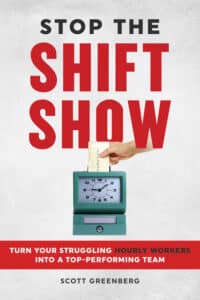
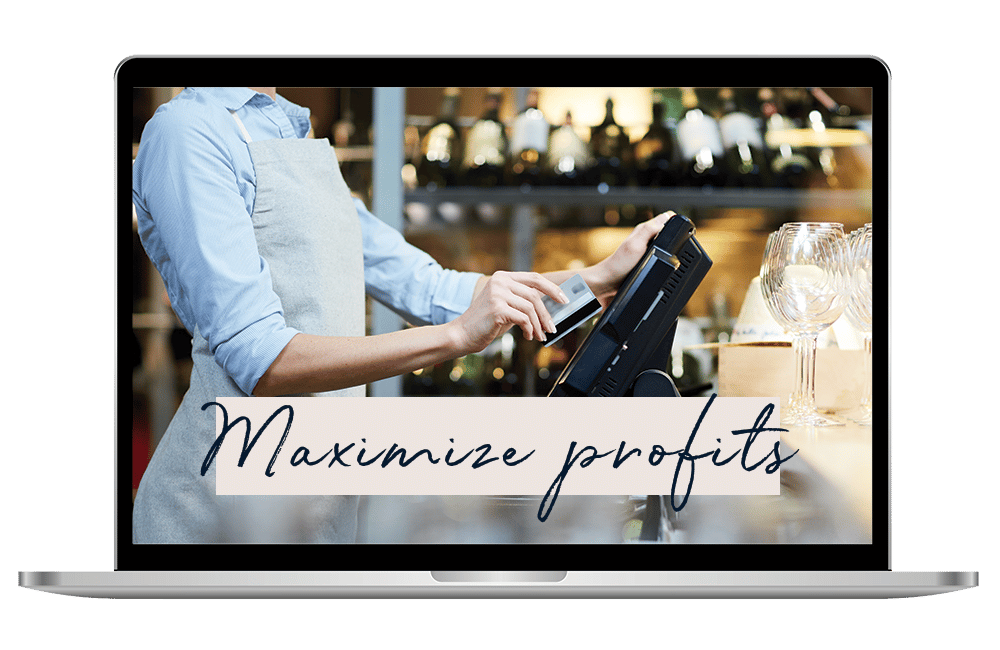
The three costly mistakes you could unknowingly be making?
Find out in this FREE guide and restaurant assessment specifically designed to reveal the unexpected hurdles standing between you and exponential business growth.
Thank You To Our Sponsors
For a limited time only, popmenu is offering our listeners $100 off your first month plus an unchanging lifetime rate.
Request a DEMO:
Did You Know That 7 out of 10 Adults Dine Out To Celebrate Birthdays?
You Can Easily Capture This Lucrative Business!
Want to become a podcast sponsor?
Please get in touch with Roger at roger@restaurantrockstars.com

